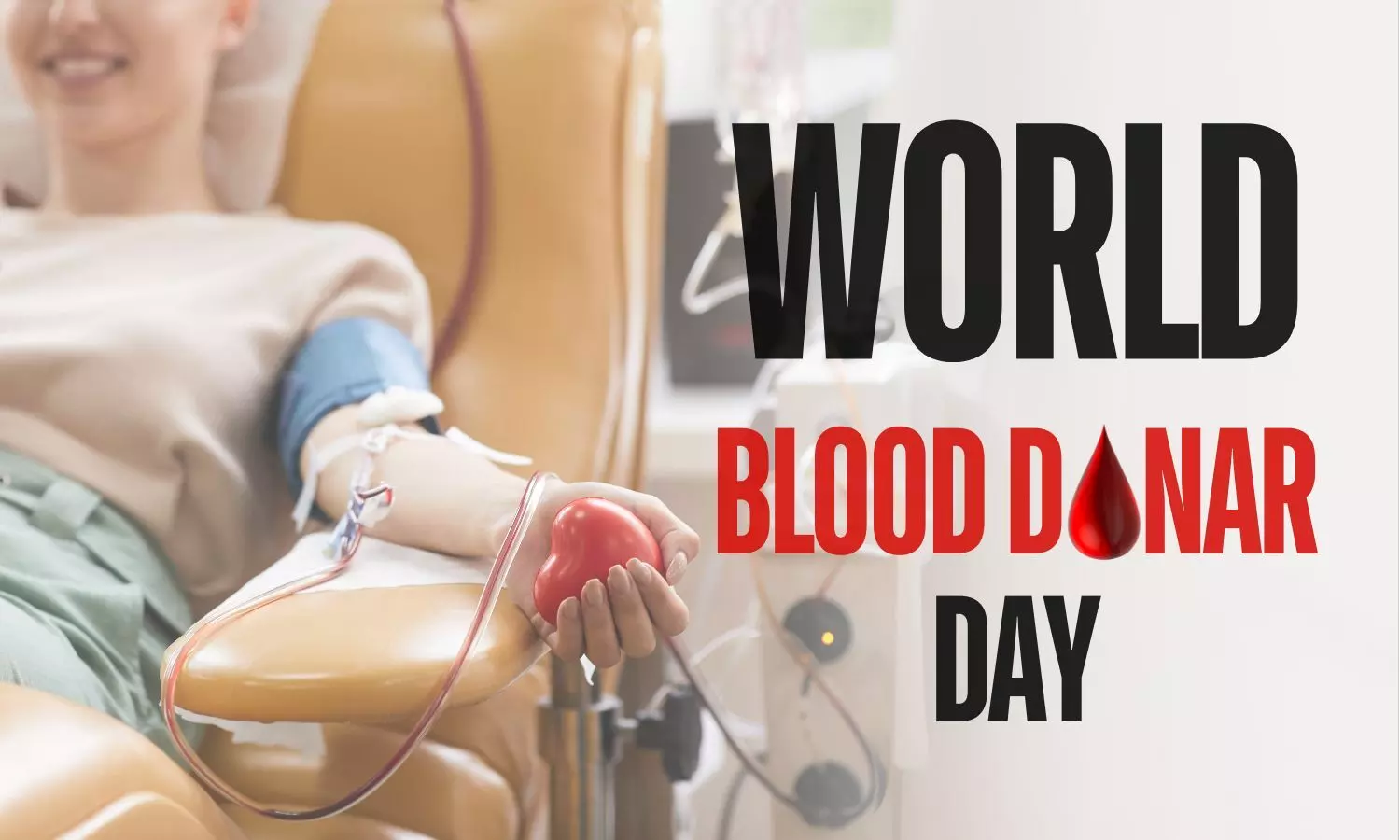World Blood Donor Day 2024: All you need to know

Learn the significance of World Blood Donor Day, its history, health benefits, and key considerations for blood donation.
World Blood Donor Day (WBDD) is an annual global event that highlights the critical importance of blood donation. It serves as a reminder of the indispensable role voluntary blood donors play in saving lives. Timely blood transfusions are vital for individuals facing various medical challenges, such as accidents, diseases like anaemia and leukaemia, or during emergencies like natural disasters. The availability of safe and adequate blood is not only a cornerstone of effective healthcare policies but also a lifeline for countless patients worldwide.
A well-coordinated blood supply network, as recommended by the World Health Organisation, ensures that blood collection, testing, processing, storage, and distribution are efficiently managed at the national level. This infrastructure is essential for guaranteeing that patients have access to sufficient quantities of safe blood and blood products whenever needed. Each WBDD adopts a different global theme to honour the altruism of blood donors who selflessly contribute to the well-being of others. Through WBDD, societies worldwide express gratitude to these unsung heroes while promoting broader awareness about the importance of blood donation in sustaining and enhancing public health systems.
When is World Blood Donor Day?
World Blood Donor Day is celebrated annually on June 14th. It is a collaborative effort of key international bodies, including the World Health Organisation, the International Federation of Blood Donor Organisations (IFBDO), the International Federation of Red Cross and Red Crescent Societies, and the International Society of Blood Transfusion (ISBT). The day serves as a poignant reminder of the necessity for safe blood and blood products while expressing gratitude to blood donors for their invaluable contributions to saving lives. Through this observance, awareness is raised globally about the critical importance of blood donation in sustaining healthcare systems and supporting those in need.
World Blood Donor Day history
World Blood Donor Day was initiated by the World Health Organisation in 2004 and officially recognised during the 58th World Health Assembly in 2005. It serves as a global occasion to raise awareness about the importance of donating blood. The roots of blood donation trace back to ancient times, but significant advancements began in recorded history, notably with the work of English physician Richard Lower.
Lower's experiments with blood transfusion and his understanding of the heart and lungs laid a foundation for modern transfusion practices. However, the WHO chose to honour Karl Landsteiner's birthday as World Blood Donor Day. Landsteiner, an Austrian-American scientist, revolutionised the field with his discovery of blood groups and contributions to the modern transfusion system. This earned him the Nobel Prize in 1930. Celebrating his legacy highlights the vital role of blood donors and commemorates the ongoing advancements in blood transfusion science.
Importance of Blood Donation
World Blood Donor Day quotes stress the crucial role of blood donation in sustaining well-being. Blood not only transports essential nutrients and oxygen but also facilitates clotting to prevent excessive bleeding. Regular blood donation not only saves lives and aids transfusion-dependent patients but also fosters physical and mental well-being for donors. As Mahatma Gandhi said, "The best way to find yourself is to lose yourself in the service of others." Giving blood is a noble act that enriches both the giver and the receiver.
Health benefits of Blood Donation
- Donating blood supports emergencies, surgeries, and cancer treatments, benefiting both recipients and donors.
- Regular blood donation helps maintain healthy iron levels, reducing the risk of conditions like hemochromatosis and protecting against heart diseases.
- Blood donation aids in the early detection of health issues such as anaemia and infectious diseases, enabling timely intervention.
- After donation, the body quickly replenishes lost blood volume within 48 hours, generating new cells and improving overall health.
- Donors often experience faster recovery from illnesses, longer lifespans, weight loss, and reduced risks of liver problems and cancer.
Things to consider while Blood Donation
When considering blood donation, it's crucial to prepare your body beforehand for an optimal experience. Ensuring you have had a nutritious meal and adequate rest prior to donation is essential.
Familiarising yourself with the blood donation process can help alleviate any concerns you may have. Typically, the procedure involves registration, a brief medical history form, a quick physical examination, and the actual blood donation itself.
After donating blood, it's important to replenish your body's resources. Drinking plenty of fluids, particularly water, helps replace the volume lost during donation.
Avoiding strenuous physical activity and weightlifting for a few hours post-donation is advised. Consuming a nutritious snack can also help boost energy levels.
Immediately following blood donation, it's essential to be mindful of your health. Some individuals may experience transient side effects such as light-headedness, dizziness, or bruising at the needle insertion site. Fortunately, these symptoms typically resolve on their own shortly after donation.
Being mindful of these considerations can contribute to a positive and fulfilling blood donation experience, allowing you to make a valuable contribution to those in need while ensuring your own well-being.

